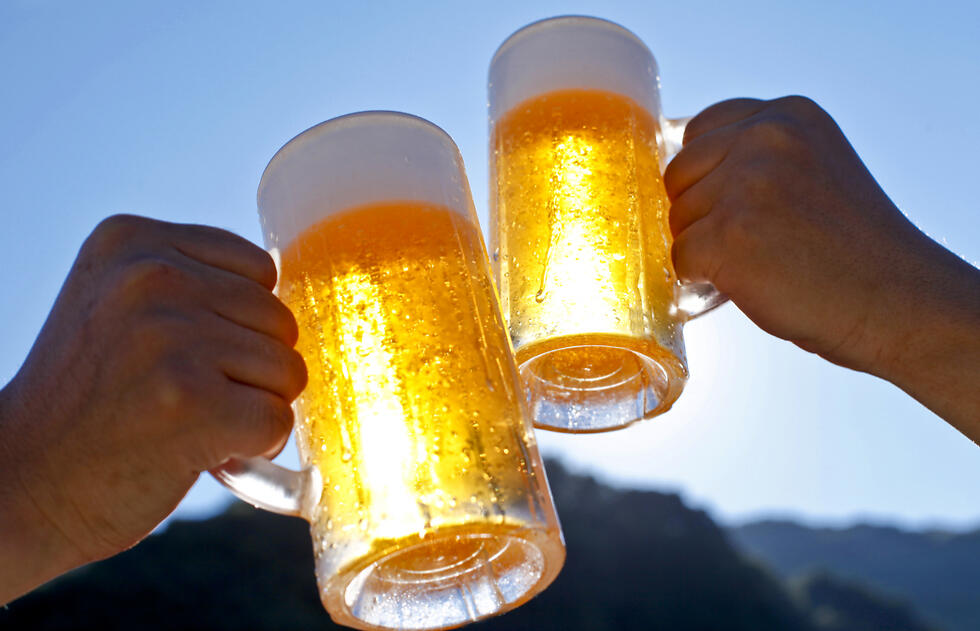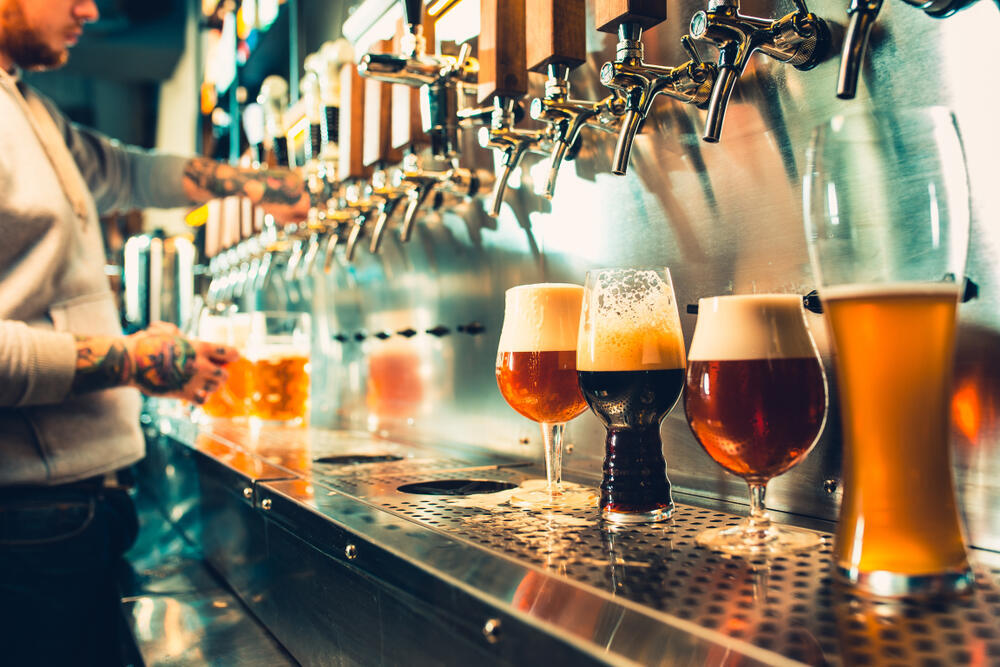Independence Day in Israel is much more than a national holiday—it transforms into a massive culinary celebration. Every year, crowds of Israelis head to parks, backyards, and open spaces across the country, lighting up their grills. Alongside skewered meats, sausages, and roasted vegetables, a cold glass of beer has become a staple of the festivities.
In recent years, alongside international beer brands, Israel has seen a remarkable growth in its local beer culture. Numerous boutique breweries have sprung up across the country, offering a wide variety of styles and flavors, allowing Israelis to explore a rich world of locally brewed beer.
From light and refreshing lagers to aromatic ales and complex dark beers, there is now an Israeli beer for almost every palate. Traditional brands like Goldstar and Maccabee remain popular, but boutique beers like Malka, Jem’s, Alexander, Shikma, and many others have earned their place of honor. Some boutique breweries even incorporate local ingredients such as dates or citrons into their beers.
The beer celebration on Independence Day reflects the peak of a beer culture that is steadily developing in Israel. To add a little more "foam" to the festivities, here are some amusing and fascinating facts about the world of beer:
- The oldest beer recipe: The oldest written beer recipe, approximately 4,000 years old, was found on a Sumerian clay tablet praising the beer goddess Ninkasi.
- Safer than water: In medieval Europe, the boiling process during beer brewing made it safer to drink than water, which was often contaminated. Even children drank low-alcohol beer.
- Fear of an empty glass: There is a specific fear called "cenosillicaphobia," which is the fear of an empty beer glass.
- The first brewers were women: In early history, beer brewing was primarily done by women and considered a domestic craft. Even today, in some parts of the world, traditional beer brewing remains a women’s domain.
- Beer as payment: In ancient Babylon and Egypt, workers, including the builders of the pyramids, were often paid in beer as part of their daily wages.
- Beer and cannabis connection: The hops plant, an essential ingredient in most beers, belongs to the same botanical family as the cannabis plant.
- Beer in space: NASA has conducted experiments brewing beer in microgravity to study fermentation processes outside Earth.
- Foam matters: The foam at the top of a beer glass, called "head," plays an important role in releasing the beer’s aromas and preserving its carbonation.
- Beard yeast beer: A British brewery once created a beer using yeast collected from a brewer’s beard.
- Underwater beer: In 2010, a 170-year-old beer was discovered on a 19th-century shipwreck off the coast of Finland. The beer survived thanks to the low temperature and darkness at the bottom of the sea.
- Beer spas: In some countries, like the Czech Republic, there are "beer spas" where people can bathe in tubs containing beer ingredients like hops and barley, which are believed to be good for the skin.
- The longest bar in the world: The longest bar in the world is in Munich, Germany, stretching over 700 meters. Almost all the drinks served there are beer.
- Ancient beer laws: Under the ancient Babylonian Code of Hammurabi, selling diluted beer could result in severe punishment, including drowning in one’s own beer.
- Hungarian hangover record: The longest hangover ever documented lasted four weeks and was experienced by a Hungarian man in 1982 after consuming a large amount of beer.
- Low-calorie beer? Think again: While some beers market themselves as "light," the average beer contains about the same calories as a can of soda. However, beer is generally more filling.
- Why beer tastes better in pubs: Draft beer in pubs often tastes better than bottled or canned beer because it is less exposed to oxygen and light, which can damage its flavor.
In short, the next time you hold a glass of beer, remember that it is part of an ancient and fascinating global tradition—and, of course, an integral part of the contemporary Israeli celebration. Speaking of celebrations, here are some beers worth raising a glass to this year:
- Shikma Brewery’s special Independence Day pack: To mark Israel’s 77th Independence Day, Shikma Brewery has released a pack featuring three flavors: IPA, a light and fruity Amber Ale suited to the Israeli summer, and a unique German-style Bitter Wit with banana and citrus notes—all brewed with Israeli barley malt. The pack includes a beer glass and costs approximately $8.
- Malka Beer’s tribute to Srulik: Malka Beer has launched a special edition dedicated to the iconic Srulik cartoon created by cartoonist Dosh. Representing the optimistic Israeli sabra, Srulik appears on the bottles and cans this year to promote unity and positivity. A pack of five bottles costs approximately $21.
- Alexander Brewery’s Lager Fest: Following its success as a trial edition, Alexander Brewery has launched Alexander Lager Fest, a German-style Festbier lager. This elegant beer, with 5% alcohol, has a golden hue, gentle sweetness, and balanced bitterness. It is unfiltered and unpasteurized, providing rich, precise flavors and aromas. A mixed pack of Alexander beers costs approximately $13.
- Mythos Beer from Greece: Mythos, a light and bright premium lager from Thessaloniki, Greece, is one of the most popular and high-quality beers in Europe. With gentle sweetness and a refreshing taste, it’s ideal for Independence Day celebrations. A single bottle (330 ml) costs approximately $2, and a six-pack costs approximately $9.
- Asahi Super Dry from Japan: This Japanese lager is light, with less malt and a dry finish. Made from high-quality ingredients like barley malt, hops, corn, and rice, it pairs excellently with Japanese cuisine, such as sushi. A single bottle (330 ml) costs approximately $2.
- Stella Artois: This well-known Belgian lager has released a new bottle and six-pack design. A six-pack costs approximately $9.
<< Get the Ynetnews app on your smartphone: Google Play: https://bit.ly/4eJ37pE | Apple App Store: https://bit.ly/3ZL7iNv >>
- Peroni from Italy: Peroni is a premium Italian lager created in Rome in 1963 and has since become an Italian icon. It features a crisp and refreshing flavor with delicate citrus notes. A single bottle (330 ml) costs approximately $2, and a six-pack costs approximately $10.
- Benediktiner from Germany: This unfiltered wheat beer, produced at the Ettal Monastery in Bavaria, follows a traditional monastic recipe from 1330. It has a deep golden color, fruity aromas, and soft yeast notes. A six-pack costs approximately $12.
- Delirium from Belgium: Delirium comes in a pack with four bottles and an original glass featuring a pink elephant design. This golden blond beer has a stable foam, a complex aroma of malt, fruit, and spices, and a rich, balanced flavor representing Belgian brewing artistry. The pack costs approximately $20
- La Guillotine from Belgium: This bright blond beer features a sparkling golden color, impressive foam, and rich flavors with a soft-bitter finish. A four-bottle pack costs approximately $20





